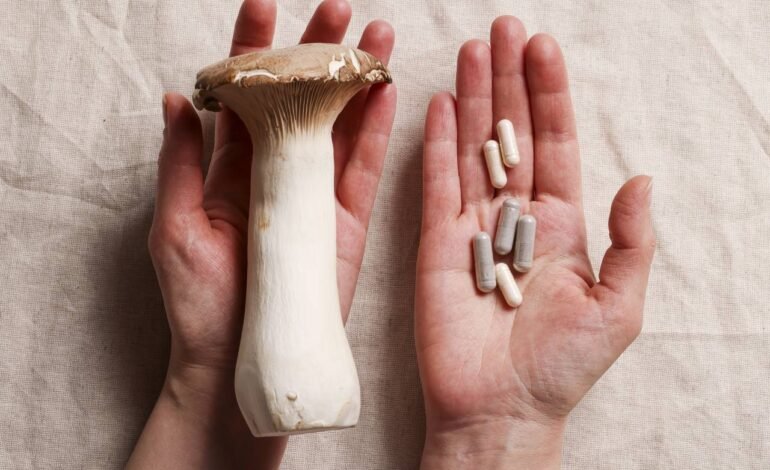Mushrooms to Boost Immunity and Fight Inflammation

The medicinal mushrooms are traditionally used to guard against infections and cancers. The mushroom possesses a lengthy tradition of usage to aid in health and well-being, especially in earlier Chinese, Egyptian, Greek, Mexican, and Roman civilizations. The year 1991, a 5,300-year-old mummified mummy was discovered to be carrying the fungus called birch polypore. It has a purgative effect. It might be utilized to treat the person’s intestinal parasites.
Modern research has proven that medicinal mushrooms can be the highest amount of bioactive and nutritional compounds which are linked to numerous positive health effects that include supporting our immune system. Learn details about the medicinal benefits of mushrooms as well as their health benefits. the top medicinal mushrooms to help immunity, and the best ways to take advantage of medicinal mushrooms.
What Are Medicinal Mushrooms?
Medicinal mushrooms are edible, large enough to be seen without special equipment, and are widely recognized for their numerous health benefits. These mushrooms have been used in traditional medicine for centuries, valued for their ability to support the immune system, boost overall wellness, and contribute to various healing processes. Today, they are increasingly popular in holistic health practices due to their proven medicinal properties. Fungi comprise molds, yeasts, and mushrooms, and thrive on dead matter that is found in soil, on animals, and plants as well as other types of fungi. There are estimated to be 14,000-22,000 species of fungi in the world and of these, approximately 20-30 are cultivated edible species, and around 15 species are foraged in the wild for consumption. They can be eaten for their nutritional value or used as a supplement to your diet.
Mushrooms provide various nutrients, such as selenium, protein, fiber, and potassium, in addition to the vitamins B1, B2, B12 C, D, and E. They also contain numerous bioactive substances like alkaloids, flavonoids, terpenes, and compounds that are phenolic, polyunsaturated fat acids, and polysaccharides. In particular, b-glucan the most common polysaccharide in mushrooms, is being studied for its prebiotic and immune-stimulating properties.
Health Benefits of Mushrooms
Studies investigating the health benefits of mushrooms have discovered about 130 potential therapeutic benefits which include:
- Anti-bacterial
- Anti-diabetic
- Anti-fungal
- Anti-inflammatory
- Anti-oxidant
- Anti-parasitic
- Anti-tumor
- Anti-viral
- Hepatoprotective (protective of the liver)
- Immunomodulating
Most research on medicinal mushrooms has relied on in-vitro studies or animal testing. However, some preliminary clinical trials suggest that diet consumption of mushrooms may lower the risk of developing breast cancer, and can alleviate symptoms associated with cancer, including sweating and insomnia.
A variety of mechanisms have been suggested to explain the positive benefits of mushrooms for immune health. Certain species of mushrooms can positively affect the gut microbiota, enhancing the protection against pathogens. Additionally, some mushrooms have been found to boost the immune system by improving the innate and adaptive immune response. In contrast, certain mushroom extracts can also reduce the immune system, producing anti-allergic effects.
Learn about ways to strengthen your immune system at Fullscript’s blog. Fullscript blog.
8 Medical Mushrooms for Your Immune Support
Below is a list of the eight most potent mushroom species that have immune-supporting properties.
1. Chaga (Inonotus obliquus)
Chaga mushrooms, sometimes known as birch mushrooms and chaga conk are dark black and brown fungus that is most commonly found on the birch tree. The presence of several compounds in chaga mushrooms can result in positive effects, such as anti-oxidant polyphenols, betulinic acid, and betulin and betulinic acid, both of which have cancer-fighting properties.
2. Cordyceps (Ophiocordyceps sinensis)
While technically not a fungus it is a rare caterpillar fungus that grows only in high-altitude areas of Sikkim the state of northeast India. The bioactive ingredients found in cordyceps are polysaccharides, cordycepin, and cordycepic acid. A study of eight weeks conducted on healthy Korean people discovered that the use of cordyceps extract increased the activity of natural immune cells (NK-cells). The increase was associated with improved immune regulation in comparison to control.
3. Lion’s Mane (Hericium Erinaceus)
Hericium erinaceus is referred to as the lion’s mane fungus due to its white fur-like appearance. Animal models have proven that lion’s Mane could encourage beneficial growth of gut microbiota and contribute to a reduction in damage to colon tissues in cases of inflammatory bowel diseases (IBD). Researchers suggest that lion’s paws may help to regulate the body’s immune system as well as improve the well-being of those suffering from IBD However clinical trials are required to verify this in humans.
4. Maitake (Grifola frondosa)
Maitake is a delicious and medicinal mushroom that has demonstrated anti-cancer effects in melanoma, breast cancer, and hepatoma cell lines in animal research. Proteoglucan a constituent of maitake, is associated with the effects of immune stimulation in the mushroom. In mice studies, proteoglycan has been shown to reduce mammary tumor cells’ behavior. Additionally, in both in-vitro and animal studies, the polysaccharides in maitake have been shown to have antiviral properties in the fight against hepatitis B as well as the human immune deficiency virus (HIV).
5. Oyster (Pleurotus)
Oyster mushrooms are a genus of fungi that includes a range of species like Pleurotus ostreatus as well as Pleurotus florida. In vitro, research has revealed that the polysaccharides found in P. ostreatus mushrooms could trigger NK cells that fight breast cancer and lung cells.
Furthermore, an extract of P. florida is a rich source of active constituents, such as flavonoids, phenolics, and polysaccharides was found to have anti-inflammatory as well as analgesic properties in animals.
6. Reishi (Ganoderma lingzhi)
Reishi is frequently called”the “king of mushrooms” or the “mushroom of immortality”. (20) Reishi has also been demonstrated to fight or treat a variety of diseases and to reduce inflammation with a diet high in cholesterol. The health benefits of reishi mushrooms could be due to their ability to regulate the microbiota composition since the polysaccharides that are found in reishi have prebiotic properties and can increase the number of beneficial bacteria within the host.
7. Shiitake (Lentinula edodes)
Shiitake mushrooms are traditionally used to treat illnesses like common colds. A clinical study of four weeks suggests that the consumption of shiitakes was linked with beneficial changes in the release patterns of a variety of immune compounds. These changes could indicate an increase in the gut immune system as well as an anti-inflammatory response. Similar to other types of mushrooms Shiitake could have anti-cancer effects. Lentinan is a glucan that comes from shiitake and is utilized as a therapy for cancer, primarily within China as well as Japan.
8. Turkey Tail (Coriolus versicolor)
The turkey tail mushroom gets its name due to the brown and tan rings that are visible on its surface. They are much like the tail feathers of a bird. In traditional medicine, turkey tail mushrooms have been used to treat fungal diseases, cancer as well as acquired immune deficiency syndrome (AIDS).
The latest research conducted in experimental models of breast cancer in animals indicates C. versicolor may have an anti-metastasis, anti-tumor effect, suggesting that it could lower the risk of developing cancerous tumors in the future. Polysaccharide-K (PSK) is a unique version of turkey tail that is approved by Japan as a complement to cancer treatment. A meta-analysis from 2007 of over 8000 patients carried out by Kyoto University Graduate School of Medicine in Japan discovered that PSK together with chemotherapy significantly increased the chance of survival of patients who had gastric cancer removed.
How to Consume Mushrooms
Medical mushrooms can be found in various types, such as powders, liquid extracts, and capsules. Culinary mushrooms, like maitake and shiitake, can be utilized in dishes like stews, soups, pasta, stir-fries, and Omelettes.
Tea is often made with dried or fresh mushrooms. The tea is made by soaking between three and 10 grams of a piece of mushroom in boiling water for about five to 10 minutes. Mushrooms that are woody or dry, like chaga or reishi, might require being steeped longer or cooked. Since it can have an intense flavor some people choose to use a sweetener, such as honey or other sweeteners for tea.
Mushroom Safety Considerations
Mushroom species recognized as edible, like the ones mentioned in the article below, are typically accepted as safe to consume. However, quality clinical research is necessary to determine the safe dosage and the effectiveness of supplementation with mushrooms for humans.
It’s crucial to remember the distinction between medicinal and psychoactive varieties of mushrooms, like Liberty Cap (Psilocybe semilanceata) which includes psilocybin, which is a well-known hallucinogen. In addition, certain wild mushrooms are laced with toxic compounds that can harm animals as well as humans. A qualified mycologist or a certified mushroom forager must be consulted to identify the types of mushrooms that are safe to consume.
The Bottom Line: Medical Mushrooms Have Shown Various Health Benefits
Medical mushrooms can be found in a variety of varieties and have been proven to improve the immune system. If you’re a person who is interested in taking a supplement to their healing properties, we recommend speaking to your integrative physician.




